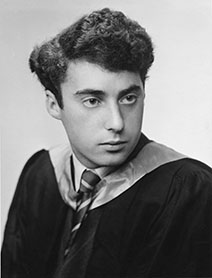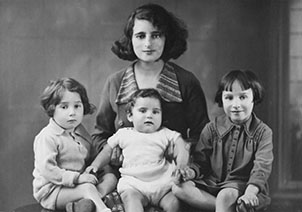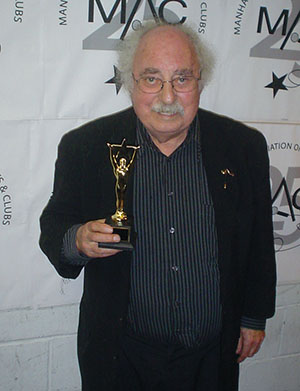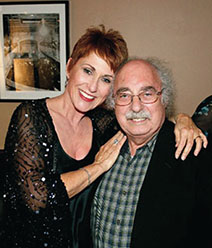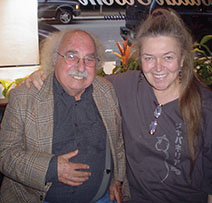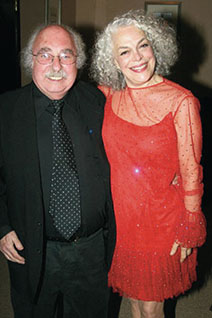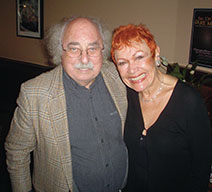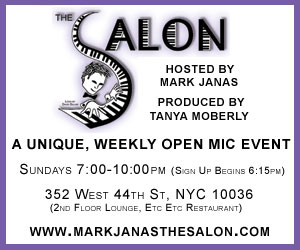Ray Jessel 1929-2015
Ray Jessel
The Millennium Noël Coward
By Les Traub for Cabaret Scenes
With the passing of songwriter, singer and comedian Ray Jessel, we thought it only appropriate to honor him by reprinting an interview conducted by Les Traub which appeared in the November 2008 issue of Cabaret Scenes.
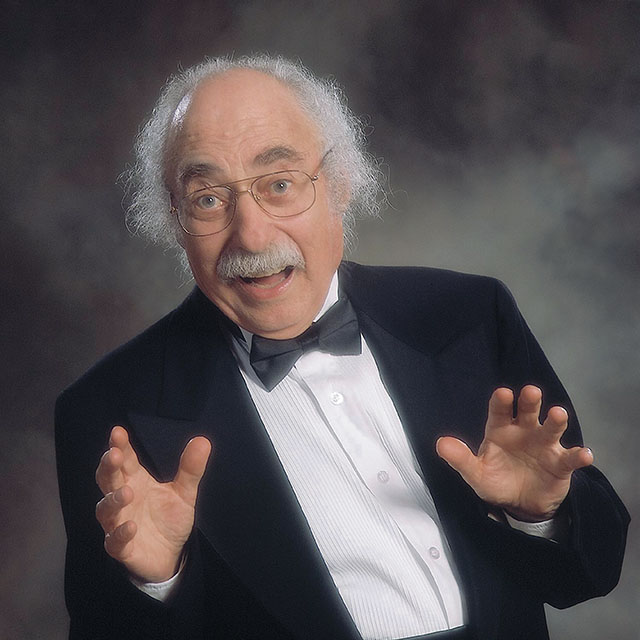 Ray Jessel’s story spans continents and careers. His success as a writer of both musicals and non-musicals on Broadway and in Hollywood, and as a performer in clubs and concerts, reflects his talent, his sense of humor and his keen eye for character. The “Millennium Noël Coward” is Michael Feinstein’s description of him. His comedy songs, or what he calls his silly songs, include such gems as “Life Sucks and Then You Die,” “Oxnard” and “The Things You Do.” His ballads, like “Whatever Happened to Melody,” “I’m All Right Now” and “Moonlight,” were written with his co-lyricist and wife, Cynthia Thompson.
Ray Jessel’s story spans continents and careers. His success as a writer of both musicals and non-musicals on Broadway and in Hollywood, and as a performer in clubs and concerts, reflects his talent, his sense of humor and his keen eye for character. The “Millennium Noël Coward” is Michael Feinstein’s description of him. His comedy songs, or what he calls his silly songs, include such gems as “Life Sucks and Then You Die,” “Oxnard” and “The Things You Do.” His ballads, like “Whatever Happened to Melody,” “I’m All Right Now” and “Moonlight,” were written with his co-lyricist and wife, Cynthia Thompson.
It seemed appropriate to chat with Ray at Tom Rolla’s Gardenia, just prior to one of MaryJo Mundy and Keri Kelsey’s Mundy on Tuesday Open Mics. After all, that is where his first public performances took place, launching him into cabaret stardom. You can catch a bit of that stardust during one of his upcoming performances (November12 & 16) at Don’t Tell Mama in New York City.
Les Traub How long did it take you to become an overnight sensation?
Ray Jessel [Laughs] Seventy-two years, I guess. The cabaret-performing thing is actually my fourth career. I started out wanting to be a serious composer but made my living arranging and hoping to write movie scores, which never quite happened. Then songwriting took over.
I met this marvelous musician named Marian Grudeff, a concert pianist. She was musical director of an annual Toronto satirical revue called Spring Thaw. She persuaded me that I could make a few dollars writing music for them. We eventually collaborated on that and other things, and she introduced me into the world of the Great American Songbook. We went down to Tamiment in the Poconos where they put on weekly shows. It became famous because Carol Burnett, Woody Allen and others came out of there. Our work came to the attention of BMI and they encouraged us to write a musical theater audition piece. We found a public domain subject, P.T. Barnum, and wrote six songs. There was eventually a Barnum show—but not ours. Our score was heard by Alexander H. Cohen, who fell in love with our stuff. Like a Hollywood movie, we went in and played our stuff, thinking it was going to be ‘thank you and goodbye.’ We walked out with a contract for a Broadway musical! That show never happened, but he had a problem with a show called Baker Street. The book was serviceable, but the songs in it were not. We were asked to insert some songs, and the director of that project at the time liked them and suggested we write the whole score, which we did. After Baker Street, we were involved in a couple of projects that either closed out of town or never happened for various reasons.
LT Care to mention any of those projects?
RJ We did a version of Hellzapoppin’, of which Alexander Cohen did two. Ours was with Soupy Sales and it played at the Montreal Expo in ’67, with, interestingly, Brandon Maggart—Maude Maggart’s dad—as one of the comics in the show. The one thing we did get out of the show was amazing recordings of the title song by Louis Armstrong and Jimmy Durante. Eventually, I finally realized that if you had a hit on Broadway you could make a killing but you couldn’t make a living.
LT How did you get from there to Hollywood?
RJ I had some friends in television in Hollywood, from Toronto days, and one of them got me a writing position on The Golddiggers Show, which was the summer replacement for The Dean Martin Show. Greg Garrison, the producer and director of the show, used the summer show to see if he could find writing talent for The Dean Martin Show. I was picked up for that show, but during that period I got on to what I guess is my third career. I was expected to write musical comedy material, but also sketches. I transmuted into a verbal comedy writer and writing music by chance, if a show needed a song. That was my career for the next twenty years or so. I wrote for The Carol Burnett Show, Donny & Marie, Captain & Tennille, and then The Love Boat.
LT After a successful Hollywood career, what brought you back to New York?
RJ I got a call from the aforesaid Alexander Cohen, who asked me if I would like to write with Richard Rodgers. The score for I Remember Mama was written with Marty Charnin, but they were having problems on the road and Charnin was leaving the show. They were going to have a new director and a new lyricist. I had this amazing period where I was writing with Richard Rodgers. But then I headed back to Hollywood, where gradually the TV gigs were fading away. There is a lot of ageism in Hollywood and I think right from the beginning I wrote posthumously!
LT What followed your TV career?
RJ I started writing songs again, but that is a slow process: writing songs, making demos and getting them out to performers, hoping they would record them.
LT What led to the transition from songwriter to singer-songwriter?
RJ I used to play silly songs at parties. At one of these parties, Michael Feinstein, who had already recorded one or two of our songs, asked if he could use one or two of the silly songs in his act. Since I wasn’t performing, it was fine with me. Eventually he came to me saying that he was getting laughs with these songs, but that I should be out there doing them. He was really one of the prime movers in my latest career. He made the point that nobody was doing these anymore—Tom Lehrer wasn’t performing and Allan Sherman was no longer with us. I didn’t really have enough songs for an act, but it did start my head going. Another prime mover was our friend Shelly Goldstein. She was just getting back into cabaret from a writing career. She was going to open mics like the one here at the Gardenia tonight, and other ones around town. She told me to come along with her, and I did, singing the odd song and enjoying it. Finally I got enough material together and I asked Tom Rolla if he had an evening available, which he did and that was it. I debuted my act and the rest is history!
LT Were you influenced by other songwriters?
RJ Yes. A typical party I would go to would be at Marshall Barer’s crazy place in Venice. Marshall was a wonderful singer. Various people would get up and sing and perform, which would lead to the climax of the evening where Marshall would get up and sing and perform his beautiful songs. Brandon Maggart and Ronny Graham were among the gang of people that used to hang out there. I used to love to come and watch Ronny work here at the Gardenia. In many ways, what Ronny did was a model for what I do. He was a composer doing his own funny stuff. I listened to Tom Lehrer, but I didn’t think at the time that I’m going to write like that. I used to enjoy the English team of Flanders and Swann, who were a little more ‘fey,’ I guess is the word. Of course, Gilbert & Sullivan are at the roots of all of this.
LT Did you have a formal educational background in music?
RJ Yes, I have a Bachelor’s degree from the University of Wales in Cardiff. I started out to be a serious composer. I did a year in Paris with Arthur Honegger, the Swiss composer. I was a big fan of Bartok, which was the direction I wanted to go.
LT What role did music play in your childhood?
RJ I was born in Hereford, England, and raised in Cardiff, where my mother was from. She was sort of theatrical but not musical. There was always a piano around the house and my parents saw to it that we had music lessons. They had a lot of friends who were in what is called vaudeville over here but was called variety over there. If the friends were playing Cardiff, they would come by the house for a party and would perform. As an eight-, nine- or ten-year-old, I was trotted out to play for them.
LT Your various careers seem to have happened almost spontaneously.
RJ There were happenstances, lucky chances, but it wasn’t quite so sudden. For instance, Alex Cohen, in addition to his Broadway work, got the job of booking the O’Keefe Theatre in Toronto. We were involved with writing material for a revue that played the theatre. The guy producing the revue knew Alex and we asked him to arrange a meeting where Alex could hear our material. We went up on the stage and played our stuff for him. He could have said ‘no,’ but he didn’t. There was luck involved. We were lucky that we chose the topic of P.T Barnum, even though the show didn’t happen. Alex was crazy about Barnum. He thought of himself as a latter day P.T. Barnum—the ultimate showman. He related to the songs because he imagined himself in that position. That was sheer luck, I suppose. But luck was only a part of it. We were ready. The stuff was damn good!
Category: Cabaret Features, Listings and News, Los Angeles Cabaret Features, Los Angeles Listings and News

